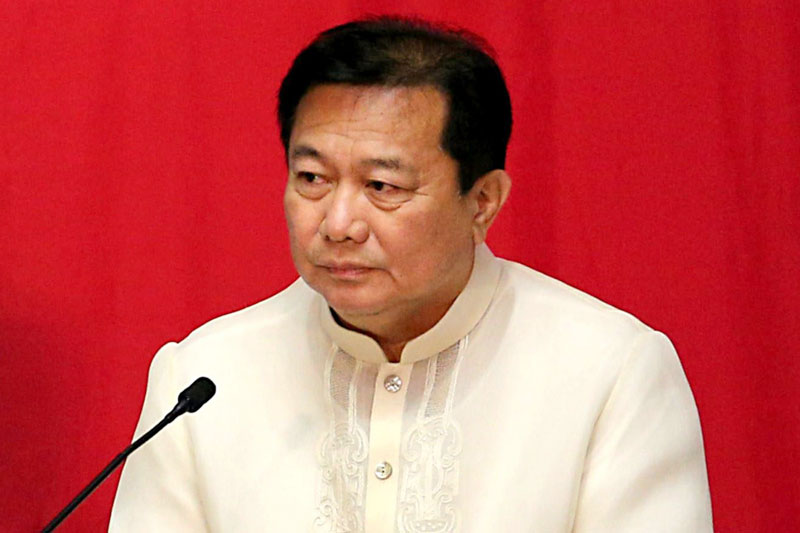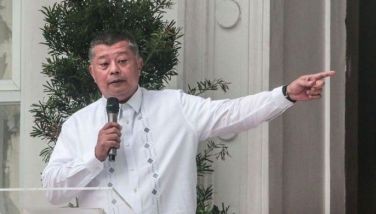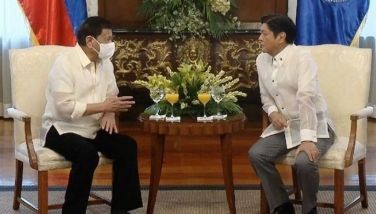‘Cha-cha to bring in new investments’
September 3, 2006 | 12:00am
Two of the country’s biggest business organizations debunked yesterday claims made by anti-Charter change groups that constitutional reforms are unnecessary to boost investments.
Ambassador Donald Dee, president of the Philippine Chamber of Commerce and Industry (PCCI) and Francis Chua, head of the Federation of Filipino-Chinese Chambers of Commerce and Industry Inc. (FFCCCII), said no amount of good governance or consistency in economic policies are enough to attract foreign investors if a constitution discourages them from bringing in capital and new technologies into the country.
"The problem with the claim that we don’t need Charter change to attract investments is that it was based on a survey conducted among people who have the money to invest — the elite," said Dee.
"But if you are speaking for the whole nation," he added, "then one should realize that infrastructure buildup, consistency of policies and good governance are not sufficient to sustain growth and attract the huge investments we need to create enough jobs for a country that has an exploding population."
"This is not possible in the 1987 Constitution," Dee said.
Dee and Chua noted that with local capital remaining inadequate to boost the economy, foreign investments are indispensable in sustaining growth and developing capital-intensive industries that would create decent paying jobs for Filipinos.
Chua pointed out that the 1987 Charter is not attuned to present-day realities, where global competitiveness is crucial to economic survival.
"Why don’t we give a chance for our economy to fully develop by opening it up to foreign investments and technologies? We should not close our mind to the fact that Charter change is the key to achieve this goal," he said.
The big business leaders also threw their full backing for the immediate conduct of a plebiscite for constitutional reforms.
On Friday, the Philippine Transport and General Workers Organization also joined the growing roster of organized labor committed to support the irreversible movement to amend the Charter to shift the country from the presidential system to a unicameral parliamentary government adopted by many successful democracies in Asia and Europe.
Proponents of Charter change are set to defend their case before the Supreme Court after the Commission on Elections (Comelec) threw out their petition for a people’s initiative mode to amend the Constitution.
And they are confident that the high court would give the petition due course.
The Union of Local Authorities of the Philippines (ULAP) and the Sigaw ng Bayan claimed circumstances that led the high tribunal to declare Republic Act 6735 as insufficient to carry out the people’s initiative are entirely different from those surrounding the present campaign.
In a press statement, ULAP president and Bohol Gov. Erico Aumentado said the petition for a people’s initiative filed by Jesus Delfin nine years ago was short of signatures needed to set the process in motion.
On the other hand, Aumentado said the Aug. 25 petition they filed with the Comelec came complete with 6.3 million duly verified signatures by city and municipal election officers as certified registered voters in all of the country’s 213 legislative districts.
The 6,327,952 verified signatures, or 14.53 percent of the total number of registered voters nationwide, is beyond the 12 percent constitutional requirement and represents at least three percent of the registered voters in each of the country’s 213 legislative districts. This is a fundamental prerequisite that was established by the Comelec in its ruling to trash the petition, citing the absence of an enabling law.
"The Comelec itself had virtually upheld the sufficiency of the petition and the integrity of the signature-gathering process in declaring in its en banc resolution that, the signatures in the instant petition appear to meet the required minimum (percentage) of the total number of registered voters," said Sigaw ng Bayan spokesman lawyer Raul Lambino.
Lambino said another difference between the Delfin petition of 1997 is that it sought to lift the term limits for elective officials, particularly the President, while the new petition endorsed by almost nine million Filipinos proposes the shift to a unicameral parliamentary system from the present presidential form. This proposal, he said, does not favor any public official rather, it will pave the way for a more stable, gridlock-free political system.
Also, according to Lambino, Delfin committed the grave error of asking the Comelec to set the time and date for the signature gathering.
The Sigaw-ULAP petition, Lambino said, was already sufficient in both form and substance based on the provisions of Section 4, Article 17 of the Constitution, by the time it was submitted to the poll body.
He reiterated the Comelec committed a grave abuse of discretion in its ruling.
Lambino cited another difference between the Delfin and Sigaw-ULAP petitions. While the Delfin petition highlighted the incompleteness of its plea by asking the Comelec to instruct its municipal election registrars in all regions to assist them in establishing signature stations, the Sigaw-ULAP petition already asked the Comelec to set a plebiscite within 60 to 90 days because the signature gathering was already finished and had fully complied with all the requirements set under the Constitution.
"Clearly, the circumstances now and in 1997 are starkly different. The Supreme Court would likely have to look at the Sigaw-ULAP petition in a whole new perspective," he said.
ULAP legal counsel Al Agra noted that the SC would have to give weight to the wisdom of the two remaining justices in the bench who were around when the 1997 ruling was handed out by the SC.
They are incumbent Chief Justice Artemio Panganiban and the most senior member of the tribunal, Associate Justice Reynato Puno.
Agra recalled that the dissenting opinions of Panganiban and Puno, along with Justice Ricardo Francisco, which were concurred in by Justices Jose Melo and Vicente Mendoza, pointed out that RA 6735 sufficiently implements the right of the people to initiate constitutional amendments through the people’s initiative.
More importantly, Agra noted that Puno stressed in 1997 that the Supreme Court should not preempt any future effort to exercise the right to initiative correctly and judiciously.
"The fact that the Delfin petition proposes a misuse of initiative does not justify a ban against its proper use," Puno had said in his opinion.
Justices Panganiban, Puno and Francisco also pointed out in their separate opinions that signature gathering for a people’s initiative is a right guaranteed by the Constitution that cannot be curtailed and that the campaign to amend the Charter is an exercise of the freedom of speech and the right to petition government for redress of grievances, Agra said. — Jaime Laude
Ambassador Donald Dee, president of the Philippine Chamber of Commerce and Industry (PCCI) and Francis Chua, head of the Federation of Filipino-Chinese Chambers of Commerce and Industry Inc. (FFCCCII), said no amount of good governance or consistency in economic policies are enough to attract foreign investors if a constitution discourages them from bringing in capital and new technologies into the country.
"The problem with the claim that we don’t need Charter change to attract investments is that it was based on a survey conducted among people who have the money to invest — the elite," said Dee.
"But if you are speaking for the whole nation," he added, "then one should realize that infrastructure buildup, consistency of policies and good governance are not sufficient to sustain growth and attract the huge investments we need to create enough jobs for a country that has an exploding population."
"This is not possible in the 1987 Constitution," Dee said.
Dee and Chua noted that with local capital remaining inadequate to boost the economy, foreign investments are indispensable in sustaining growth and developing capital-intensive industries that would create decent paying jobs for Filipinos.
Chua pointed out that the 1987 Charter is not attuned to present-day realities, where global competitiveness is crucial to economic survival.
"Why don’t we give a chance for our economy to fully develop by opening it up to foreign investments and technologies? We should not close our mind to the fact that Charter change is the key to achieve this goal," he said.
The big business leaders also threw their full backing for the immediate conduct of a plebiscite for constitutional reforms.
On Friday, the Philippine Transport and General Workers Organization also joined the growing roster of organized labor committed to support the irreversible movement to amend the Charter to shift the country from the presidential system to a unicameral parliamentary government adopted by many successful democracies in Asia and Europe.
And they are confident that the high court would give the petition due course.
The Union of Local Authorities of the Philippines (ULAP) and the Sigaw ng Bayan claimed circumstances that led the high tribunal to declare Republic Act 6735 as insufficient to carry out the people’s initiative are entirely different from those surrounding the present campaign.
In a press statement, ULAP president and Bohol Gov. Erico Aumentado said the petition for a people’s initiative filed by Jesus Delfin nine years ago was short of signatures needed to set the process in motion.
On the other hand, Aumentado said the Aug. 25 petition they filed with the Comelec came complete with 6.3 million duly verified signatures by city and municipal election officers as certified registered voters in all of the country’s 213 legislative districts.
The 6,327,952 verified signatures, or 14.53 percent of the total number of registered voters nationwide, is beyond the 12 percent constitutional requirement and represents at least three percent of the registered voters in each of the country’s 213 legislative districts. This is a fundamental prerequisite that was established by the Comelec in its ruling to trash the petition, citing the absence of an enabling law.
"The Comelec itself had virtually upheld the sufficiency of the petition and the integrity of the signature-gathering process in declaring in its en banc resolution that, the signatures in the instant petition appear to meet the required minimum (percentage) of the total number of registered voters," said Sigaw ng Bayan spokesman lawyer Raul Lambino.
Lambino said another difference between the Delfin petition of 1997 is that it sought to lift the term limits for elective officials, particularly the President, while the new petition endorsed by almost nine million Filipinos proposes the shift to a unicameral parliamentary system from the present presidential form. This proposal, he said, does not favor any public official rather, it will pave the way for a more stable, gridlock-free political system.
Also, according to Lambino, Delfin committed the grave error of asking the Comelec to set the time and date for the signature gathering.
The Sigaw-ULAP petition, Lambino said, was already sufficient in both form and substance based on the provisions of Section 4, Article 17 of the Constitution, by the time it was submitted to the poll body.
He reiterated the Comelec committed a grave abuse of discretion in its ruling.
Lambino cited another difference between the Delfin and Sigaw-ULAP petitions. While the Delfin petition highlighted the incompleteness of its plea by asking the Comelec to instruct its municipal election registrars in all regions to assist them in establishing signature stations, the Sigaw-ULAP petition already asked the Comelec to set a plebiscite within 60 to 90 days because the signature gathering was already finished and had fully complied with all the requirements set under the Constitution.
"Clearly, the circumstances now and in 1997 are starkly different. The Supreme Court would likely have to look at the Sigaw-ULAP petition in a whole new perspective," he said.
ULAP legal counsel Al Agra noted that the SC would have to give weight to the wisdom of the two remaining justices in the bench who were around when the 1997 ruling was handed out by the SC.
They are incumbent Chief Justice Artemio Panganiban and the most senior member of the tribunal, Associate Justice Reynato Puno.
Agra recalled that the dissenting opinions of Panganiban and Puno, along with Justice Ricardo Francisco, which were concurred in by Justices Jose Melo and Vicente Mendoza, pointed out that RA 6735 sufficiently implements the right of the people to initiate constitutional amendments through the people’s initiative.
More importantly, Agra noted that Puno stressed in 1997 that the Supreme Court should not preempt any future effort to exercise the right to initiative correctly and judiciously.
"The fact that the Delfin petition proposes a misuse of initiative does not justify a ban against its proper use," Puno had said in his opinion.
Justices Panganiban, Puno and Francisco also pointed out in their separate opinions that signature gathering for a people’s initiative is a right guaranteed by the Constitution that cannot be curtailed and that the campaign to amend the Charter is an exercise of the freedom of speech and the right to petition government for redress of grievances, Agra said. — Jaime Laude
BrandSpace Articles
<
>
- Latest
- Trending
Trending
Latest
Trending
Latest
Recommended






























